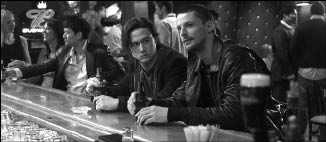A Prairie Brainstorm: The Lookout
by George Sax

You could call The Lookout just a bank-heist movie but you’d be selling it short. It’s got a bank job, to be sure, and it’s an increasingly tensile, eventually gripping little movie. But what makes it worth your time is the way that writer-director Scott Frank works his way toward the tense, frisson-punctuated moments, and to the crime-procedural scenes, in an involving but measured and unusual fashion.
He’s tried to capture his audience with more than nicely worked-out cheap thrills, although The Lookout has its excitements. (The lyrical, lushly photographed opening sequence has an ominous tone and a stunning climax.) Frank has adroitly interwoven his crime drama with an off-course coming-of-age theme.
The film really starts with the beginning of another day in Chris Pratt’s life, a scene he comments on, reading from some kind of journal in a voiceover. We also see a page from this and a disturbing, partly erased note.
Twenty-one-year-old Chris (Joseph Gordon-Levitt), it gradually transpires, has good reason for his perturbation. Four years ago, the high school hockey hotshot and cosseted princeling of a wealthy Kansas City-area family miraculously escaped with his life from a particularly terrible and especially unnecessary car crash. But he left more than a little of himself on the prairie roadside.
His injury left him mentally impaired, with some short-term memory loss and task-sequencing difficulties (hence, the little spiral notebook he carries everywhere and which we’ve heard him reading from.) His roommate (Jeff Daniels), an older blind telemarketer of calm, mildly mordant demeanor, leaves him notes about supper and other mundane matters, but Chris still sometimes erupts in paroxysms of frustration and anger.
Mostly he’s quiet, if not really placid, and struggling. The margins of his life and the scope of his possibilities have narrowed. At night, after group therapy and courses of practical instruction, he works as a janitor in a nearby, small-town bank, and tries to keep alive his perhaps hopeless aspirations to become a teller. (The notebook has a list of qualifications he’s trying to memorize.)
Chris is an earnest but deeply sad youngster, saddled with heavy personal consequences and beset with stabbing regret. He’s also saddled with a reality- and sensitivity-challenged family.
All of which makes him a very promising mark for Gary (Matthew Goode), a slick barroom buddy of recent acquaintance who inveigles his way into the young man’s life, with the assistance of a pole-dancing babe of surprisingly tender friendliness (Isla Fisher).
Frank, a veteran screenwriter (Get Shorty), has made one of the very most auspicious directing debuts in years with The Lookout. He has smoothly, almost seamlessly, joined his narrative with the film’s dynamic elements. He proceeds in a somewhat old-fashioned, almost cautious manner, but he maintains our interest through his control of character and plot. The Lookout does develop a kinetic energy and a blunt-edged payoff, but Frank hasn’t resorted to the annoying jittery, jiggy camera work that is widely assumed to generate excitement and which has invaded television. (Catch NBC’s otherwise commendable Friday Night Lights, for example.) With the excellent assistance of cinematographer Alar Kivilo, Frank has used imagery judiciously, and sometimes strikingly.
All of the cast contributes to the movie’s success, especially Fahey, but Gordon-Levitt’s performance is crucial. (Idler’s thought: If he becomes a star of any magnitude, he’ll be the only prominent American male actor with a hyphenated surname.)
His resume has already added some impressive roles since his turn as the juvenile cast member of the sitcom 3rd Rock From the Sun a decade ago. He was the psychically blocked rent boy in Mysterious Skin, and the amusingly hard-boiled high school dick in the parodistic Brick.
Here, Gordon-Levitt supplies an important plaintiveness. He seems to know how to convey thwarted and suppressed longing. In his mid 20s, he retains something of the appeal of a gamin, and a waif, but he doesn’t really lean on it. If effective acting involves faking sincerity, Gordon-Levitt has an advantage. If he can work through, and eventually out of, his boy-ingenue quality, he may have an important future, in and out of indie film.
The Lookout has two or three implausibilities or inconsistencies, including a too-safe conclusion that seems thrown together, but it’s got a lot more stuff that’s satisfying. It’s first-class pulp cinema with a moral angle, a suspense flick with heart and a conscience. It’s evidence that Scott Frank is a superior sort of movie man.
|
Issue Navigation> Issue Index > v6n13: The Trials of Ralph Hernandez (3/29/07) > Film Reviews > A Prairie Brainstorm: The Lookout This Week's Issue • Artvoice Daily • Artvoice TV • Events Calendar • Classifieds |









 Current Issue
Current Issue